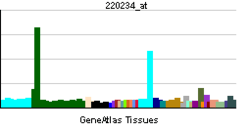CA8
Carbonic anhydrase-related protein is an enzyme that in humans is encoded by the CA8 gene.[4][5]
Function
The protein encoded by this gene was initially named CA-related protein because of sequence similarity to other known carbonic anhydrase genes. However, the gene product lacks carbonic anhydrase activity (i.e., the reversible hydration of carbon dioxide). The gene product continues to carry a carbonic anhydrase designation based on clear sequence identity to other members of the carbonic anhydrase gene family. The absence of CA8 gene transcription in the cerebellum of the lurcher mutant in mice with a neurologic defect suggests an important role for this acatalytic form.[5]
Interactions
CA8 has been shown to interact with ITPR1.[6]
References
- ↑ "Diseases that are genetically associated with CA8 view/edit references on wikidata".
- ↑ "Human PubMed Reference:".
- ↑ "Mouse PubMed Reference:".
- ↑ Nishikata M, Nishimori I, Taniuchi K, Takeuchi T, Minakuchi T, Kohsaki T, Adachi Y, Ohtsuki Y, Onishi S (Feb 2007). "Carbonic anhydrase-related protein VIII promotes colon cancer cell growth". Mol Carcinog. 46 (3): 208–14. doi:10.1002/mc.20264. PMID 17219437.
- 1 2 "Entrez Gene: CA8 carbonic anhydrase VIII".
- ↑ Hirota J, Ando H, Hamada K, Mikoshiba K (Jun 2003). "Carbonic anhydrase-related protein is a novel binding protein for inositol 1,4,5-trisphosphate receptor type 1". Biochem. J. 372 (Pt 2): 435–41. doi:10.1042/BJ20030110. PMC 1223404
 . PMID 12611586.
. PMID 12611586.
Further reading
- Bergenhem NC, Sait SS, Eddy RL, Shows TB, Tashian RE (1995). "Assignment of the gene for human carbonic anhydrase VIII(CA8) to chromosome 8q11→q12". Cytogenet. Cell Genet. 71 (3): 299–300. doi:10.1159/000134131. PMID 7587398.
- Kelly C, Nógrádi A, Walker R, Caddy K, Peters J, Carter N (1995). "Lurching, reeling, waddling and staggering in mice--is carbonic anhydrase (CA) VIII a candidate gene?". Biochem. Soc. Trans. 22 (3): 359S. PMID 7821612.
- Skaggs LA, Bergenhem NC, Venta PJ, Tashian RE (1993). "The deduced amino acid sequence of human carbonic anhydrase-related protein (CARP) is 98% identical to the mouse homologue". Gene. 126 (2): 291–2. doi:10.1016/0378-1119(93)90385-G. PMID 8482548.
- Sjöblom B, Elleby B, Wallgren K, Jonsson BH, Lindskog S (1997). "Two point mutations convert a catalytically inactive carbonic anhydrase-related protein (CARP) to an active enzyme". FEBS Lett. 398 (2–3): 322–5. doi:10.1016/S0014-5793(96)01263-X. PMID 8977131.
- Taniuchi K, Nishimori I, Takeuchi T, Fujikawa-Adachi K, Ohtsuki Y, Onishi S (2002). "Developmental expression of carbonic anhydrase-related proteins VIII, X, and XI in the human brain". Neuroscience. 112 (1): 93–9. doi:10.1016/S0306-4522(02)00066-0. PMID 12044474.
- Akisawa Y, Nishimori I, Taniuchi K, Okamoto N, Takeuchi T, Sonobe H, Ohtsuki Y, Onishi S (2003). "Expression of carbonic anhydrase-related protein CA-RP VIII in non-small cell lung cancer". Virchows Arch. 442 (1): 66–70. doi:10.1007/s00428-002-0721-y. PMID 12536316.
- Hirota J, Ando H, Hamada K, Mikoshiba K (2003). "Carbonic anhydrase-related protein is a novel binding protein for inositol 1,4,5-trisphosphate receptor type 1". Biochem. J. 372 (Pt 2): 435–41. doi:10.1042/BJ20030110. PMC 1223404
 . PMID 12611586.
. PMID 12611586.

 . PMID 12611586.
. PMID 12611586. . PMID 12611586.
. PMID 12611586.